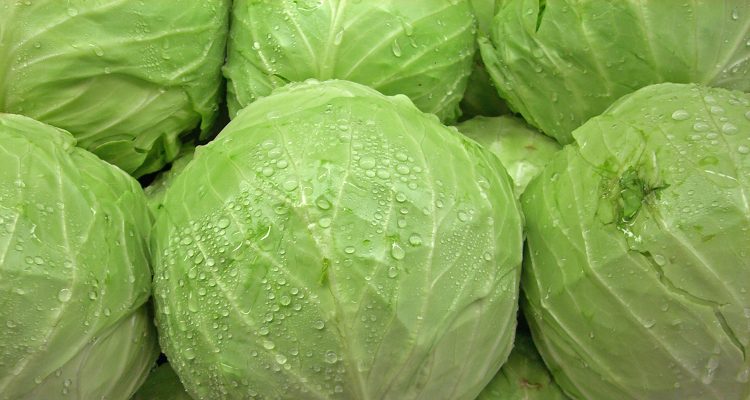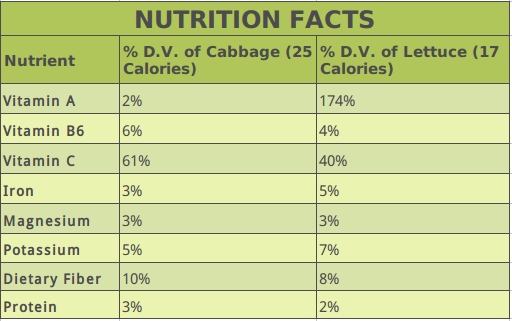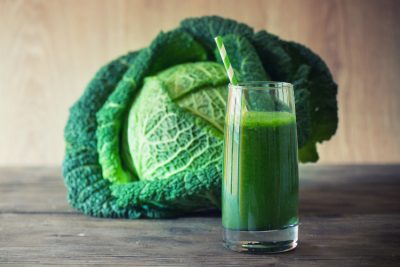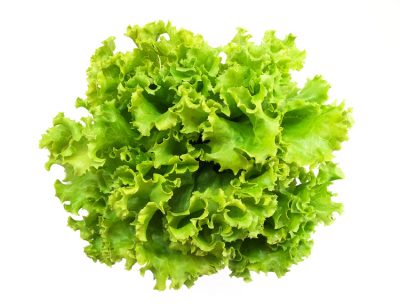
Cabbage and lettuce are two commonly eaten green leafy vegetables, yet people still confuse the two with each other. Although they look similar, cabbage and lettuce are quite distinctive from each other. Firstly, they belong to different plant families—cabbage comes from the Brassica plant family, whereas lettuce belongs to the Lactuca family or Asteraceae family of vegetables.
Both these forms of green leafy vegetables are abundant in valuable nutrition and improve immunity as they are fiber-rich. Comparatively, lettuce contains more water content than cabbage, and so, lettuce is mostly eaten as salad; while cabbage is made into coleslaw and boiled cabbage dishes.
Cabbage vs. Lettuce: Difference in Growing Conditions
What is the difference between cabbage and lettuce? One of the major aspects that separates cabbage from lettuce is its growing condition. Cabbages grow better at cool temperatures. They grow well in different types of soil except for acidic soil with a pH level higher than 6.5. The roots of cabbage can dry quickly so they must receive a constant supply of water throughout their growth.
On the other hand, lettuce needs shade and good protection from the sun to grow lusciously. They require moisture-retentive soil like light sandy soil with a pH level between 6 and 7. Like cabbage, moisture is very important for lettuce’s growth as its roots also tend to dry out easily.
Cabbage vs. Lettuce: Difference in Nutrition Content
Cabbage and lettuce exhibit a wide array of nutritional values. Both vegetables have their own goodness to offer. Cabbage and lettuce are very low in saturated fats, sodium, and cholesterol content. Relatively, lettuce has less calories and more vitamin A than cabbage. But then again, cabbage is richer in vitamin C and dietary fiber.
Cabbage Vs. Lettuce: Nutrition Table with Differences
Cabbage vs. Lettuce: Comparison of Health Benefits
Both cabbage and lettuce are storehouses of nutrients that contribute to overall good health. They have an impressive list of vitamins and minerals, and help to curb many diseases and medical conditions.
Health Benefits of Cabbage:
- Constipation
- Stomach ulcers
- Headaches
- Obesity
- Skin disorders
- Eczema
- Jaundice
- Scurvy
- Rheumatism
- Arthritis
- Gout
- Eye disorders
- Heart diseases
- Aging
- Alzheimer’s disease
1. Goodness of vitamin C
Rich in vitamin C, cabbage helps to maintain good skin health, strengthens bones, boosts metabolism, and improves mood. Vitamin C also provides defense against diseases like scurvy, stroke, and coronary heart disease.
2. Helps in digestion
Cabbage contains a good amount of dietary fiber or roughage, and is a good remedy to treat constipation and other stomach-related problems like indigestion and peptic ulcers.
3. Fights microbial infections
Cabbage also contains sulfur which fights microbial infections and reduces the chances of ulcers.
4. Prevents cancer
The antioxidants present are useful in the release of free radicals from the body, and thus helps prevent cancer and heart disease.
5. Action against inflammation
Cabbage has anti-inflammatory properties that assist with irritation, allergies, joint pain, fever, and various skin disorders.
Lettuce also provides many health benefits and especially helps with weight management. Romaine lettuce has more benefits than the commonly used iceberg lettuce, as romaine lettuce has a higher percentage of the same nutrients found in iceberg lettuce.
Health Benefits of Lettuce:
1. Improves eye health
Lettuce is an excellent source of vitamin A, which improves eye, skin and bone health.
2. Helps weight loss
Lettuce is abundant in fiber and cellulose. Fiber assists in the digestion process which is good for long-term weight control.
3. Induces sleep
Lactucarium is a white fluid which has sleep inducing properties, and lettuce leaves contain this fluid. This fluid with relaxing properties has no side effects. Drinking a glass of lettuce juice should help to get a good night’s sleep.
4. Protects Neuronal Cells
Studies have found that extracts from lettuce have a considerable impact on neuron cell growth. They control the premature death of the neuron cells due to its role in glucose/serum deprivation (GSD). It can be commonly used as a remedy to protect the neurons from neurodegenerative diseases like Alzheimer’s.
5. Blood sugar regulation
Lettuce has a low glycemic index and so it helps in regulating blood sugar levels. It hinders the sudden spike or drop of the blood sugar level.
In addition to these benefits, lettuce also has omega-3 fatty acids, antioxidant, and antimicrobial properties which promote overall good health.
Knowing all the health and nutritional benefits that cabbage and lettuce offer, be sure to incorporate these green leafy vegetables into your healthy diet regularly.
Related:
Sources:
Tremblay, S., “The Nutrition in Cabbage Vs. Lettuce,” Livestrong.com web site, May 21, 2015; http://www.livestrong.com/article/524206-the-nutrition-in-cabbage-vs-lettuce/, last accessed February 2, 2017
















